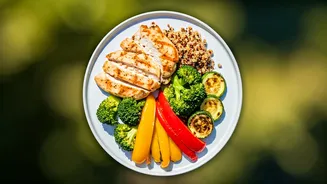Embracing Balanced Nutrition
Embarking on a journey towards a healthier lifestyle doesn't mean sacrificing taste. Understanding balanced nutrition is key. It involves incorporating
a variety of food groups into your diet, including fruits, vegetables, lean proteins, and whole grains. Focus on portion control and mindful eating to optimize your body's performance. Consider the importance of adequate hydration and regular physical activity, which work synergistically with a balanced diet to promote overall well-being. Eating a diverse range of foods provides your body with essential vitamins, minerals, and antioxidants, fortifying your immune system and boosting your energy levels. Experimenting with new ingredients and cooking techniques can make healthy eating exciting and sustainable, paving the way for long-term health benefits.
Breakfast: Fuel Your Day
Kickstarting your day with a nutritious breakfast sets the tone for optimal energy and focus. Explore diverse options, like oatmeal with berries and nuts, providing sustained energy release throughout the morning. Another alternative is a protein-packed smoothie blending fruits, vegetables, and a source of protein such as Greek yogurt or protein powder. For those who enjoy a savory start, consider scrambled eggs with vegetables or whole-wheat toast with avocado. The key is to choose options rich in fiber, protein, and healthy fats to keep you feeling full and satisfied. Make sure to avoid sugary cereals and processed pastries, opting for whole, unprocessed foods. Preparing breakfast ahead of time, such as overnight oats or breakfast burritos, simplifies your morning routine, ensuring you have a healthy start to your day even when you're short on time.
Lunch: Power Through
Lunch is the ideal time to replenish your energy levels and sustain productivity throughout the afternoon. Consider packing a nutritious lunch such as a salad packed with colorful vegetables, grilled chicken or chickpeas, and a light vinaigrette. Alternatively, create a whole-grain wrap filled with lean turkey or tofu, hummus, and various veggies. Leftovers from dinner, such as lentil soup or quinoa bowls, also make for a quick and convenient lunch. Avoid processed foods, sugary drinks, and oversized portions to prevent energy crashes. Planning your lunch in advance allows you to make healthier choices and avoid the temptation of fast food. Incorporating a variety of textures and flavors will make your lunch more enjoyable and help you stay on track with your dietary goals. Pack healthy snacks, such as fruits, nuts, or Greek yogurt, to ward off mid-afternoon cravings.
Dinner: Revitalize and Relax
Dinner provides the perfect opportunity to refuel your body and unwind after a long day. Prepare a balanced meal like baked salmon with roasted vegetables or chicken stir-fry with brown rice. For vegetarians, consider lentil pasta with marinara sauce and a side salad. Aim for portions that are appropriate for your individual needs and activity level. Experimenting with different herbs and spices can add depth of flavor without extra calories. Try cooking meals at home more often and limit eating out, which often involves higher fat, sodium, and portion sizes. Consider incorporating mindful eating practices during dinner, focusing on the taste and texture of your food. Plan your meals for the week, and prepare some of your dinner ingredients in advance for easier meal prep. Dinner is a time to nourish your body and enjoy a satisfying meal, setting you up for a restful night.
Snacks: Smart Choices
Snacks are essential for managing hunger between meals and preventing overeating. Select snacks rich in protein, fiber, and healthy fats, such as a handful of almonds, a hard-boiled egg, or Greek yogurt with berries. Vegetables like carrot sticks, cucumber slices, or bell peppers with hummus are great low-calorie options. Fruits such as an apple or a banana are also nutritious and portable snacks. Avoid sugary snacks, processed chips, and excessive amounts of crackers. Preparing snack bags or containers in advance can help prevent impulsive unhealthy choices. Paying attention to your hunger cues and eating mindfully ensures you only snack when you are truly hungry, not just bored or stressed. Having healthy snacks on hand can help you maintain your energy levels and stay on track with your dietary goals throughout the day.













